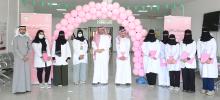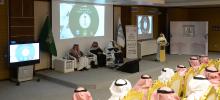Global Expert Leads Scientific Seminar on Skin Microbiota and Antimicrobials at the Faculty of Medicine

The Faculty of Medicine at King Khalid University hosted a seminar on skin conditions and diseases. The ultimate question to be addressed was whether antimicrobial drugs affect skin microbial infections. Dr. Álvaro Acosta-Serrano led the seminar. Dr. Acosta-Serrano is a professor and researcher at the Faculty of Medicine and the Tropical Epidemiology Center at the University of Liverpool in the United Kingdom. He is an internationally recognized expert in cutaneous leishmaniasis research.
Dr. Ahmed El-Hakami, head of Microbiology Department, opened the seminar by introducing the guest speaker, Dr. Álvaro Acosta-Serrano. Dr. Acosta-Serrano’s lab is currently focused on documenting the fundamental aspects of the biology of kinetoplastid parasites and their vectors and developing molecular tools to control and prevent parasite transmission in disease-endemic areas. The good doctor’s already impressive credentials are bolstered by the following memberships and positions he currently holds, including:
- The Deputy Editor-in-Chief of the PLOS Neglected Tropical Diseases Journal;
- Editorial Board member of Molecular and Biochemical Parasites;
- Board of The British Society for Parasitology.
The guest speaker started by briefing the attendees on the types, dangers, and transmission characteristics of Leishmaniasis. He further illuminated the forum with the current condition of the subject disease, to wit:
- Current estimates indicate that the disease affects between 4 and 12 million people in 98 countries;
- There are about 2 million new cases of the disease every year;
- The best estimates that this disease results in the death of between 20 and 50 thousand people per year;
- Nearly 200 million people worldwide live in affected areas in Asia, Africa, South America, Central America, and southern Europe;
- Risk factors include poverty, malnutrition, deforestation, and urbanization.
Dr. Acosta-Serrano then provided a detailed explanation of the ways in which Leishmaniasis affects the various regions within the Kingdom. He noted that the disease is found in Al-Ahsa, Asir, Medina, and Qasim. In Saudi Arabia, the disease is transmitted through sandfly bites to humans and animals. The insect bites lead to infections and severe scarring which, if left untreated, may worsen over time.
Then, there was a lively question and answer session. Topics such as the effectiveness of existing drugs and the need to mitigate risk factors were thoroughly discussed. In addition, the forum reviewed the ability of existing treatments to cure the disease and the possibility of immunological changes.
At the closing of the seminar, Dr. Acosta-Serrano received a plaque in recognition of his efforts along with the university’s commitment to support future research and scientific work on a cooperative basis to raise awareness of endemic diseases.









